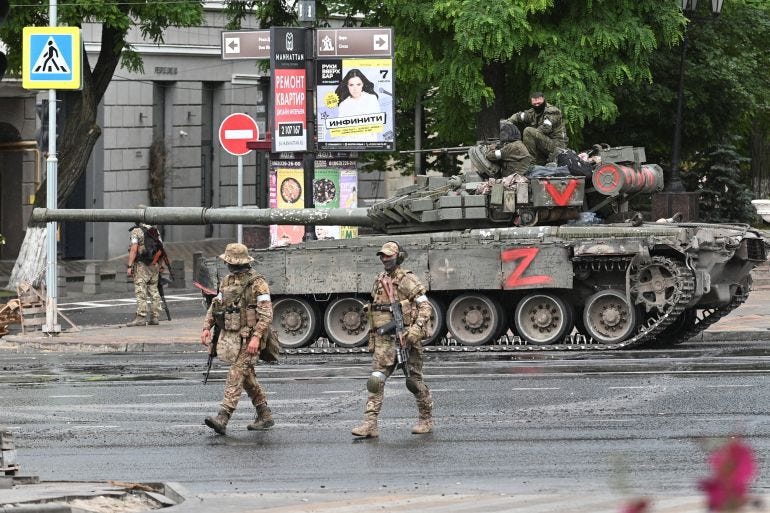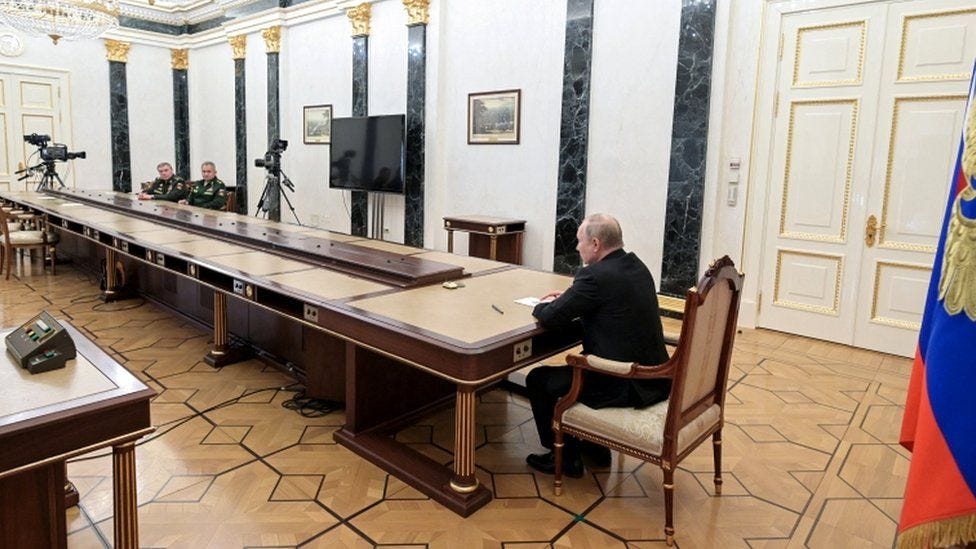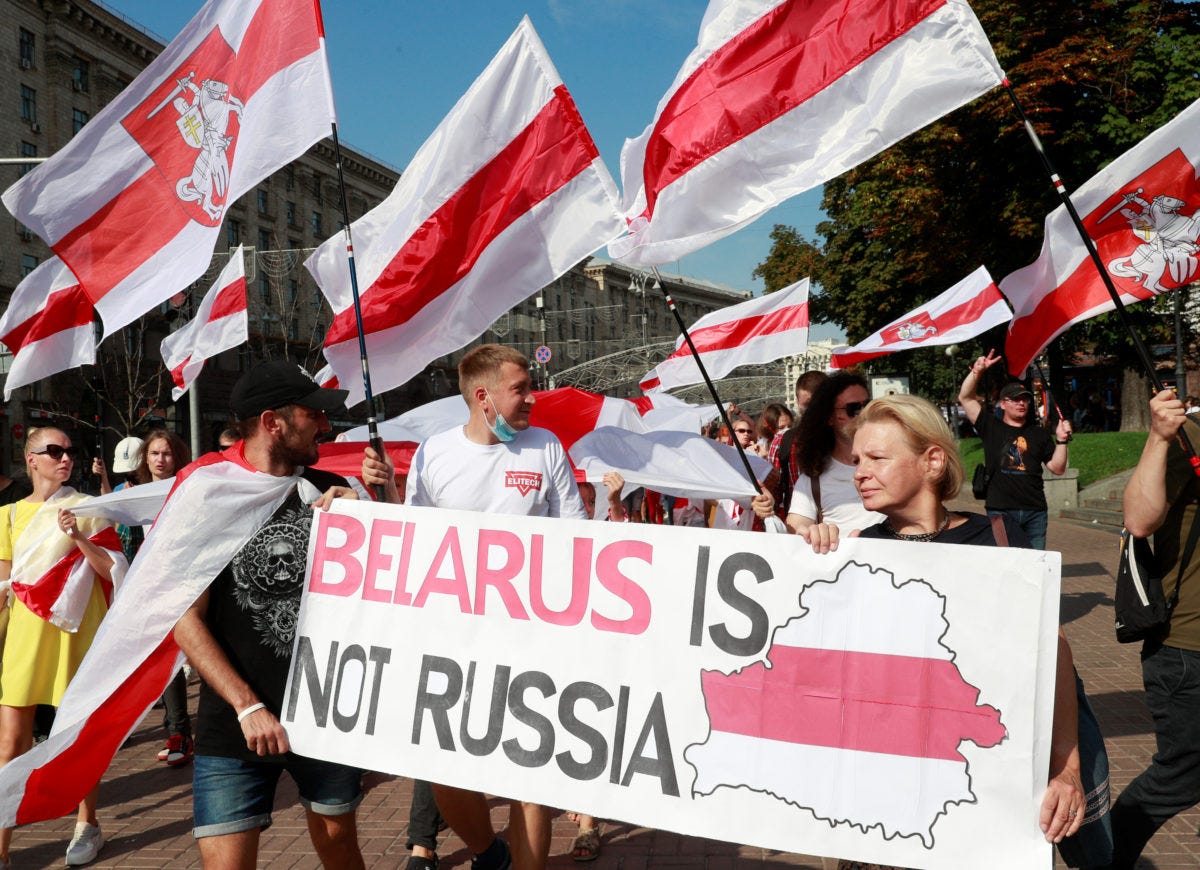Russia's Longest Day
June 21st was the northern hemisphere's Summer Solstice this year, however it was June 23-24 that was the longest day in Russia. While there had been occasional cross border attacks by Ukrainian forces as well incursions by anti-government Russian nationalists fighting in Ukraine, for the most part blowback from the massive escalation in the war launched by Vladimir Putin in February 2022 had not come home. However within the space of a day a heavily armed mercenary army was approaching Moscow, facing almost no resistance along the road. Yevgeny Prigozhin's Wagner Group can claim to be mostly responsible for Russia's only military accomplishment (victory would be too strong a term) in Ukraine this year, the capture of Bakhmut, but only after nine months of fighting and 20,000 casualties. But in not much more than nine hours they had effective control over two oblasts and were heading towards the capital (while it was rumoured Putin had already fled) when the rebellion ended. If that is what it even was in the first place....
1. The nomenclature of rebellion
When is a military coup d’état not a coup d’état? When it is a “march for justice” apparently. That such a linguistic contortion emerged out of the “special military operation” that wasn't allowed to be called a war was, perhaps, inevitable, but it's important not to let such a laboured euphemism obscure the reality of this uprising and the threat it poses to the continuation of Putin's rule. The origin of this series of extraordinary events was an order on the 10th of June by the Russian Ministry of Defence (MOD) to bring all existing private military companies (PMCs) under MOD control, including Wagner. This, along with an alleged missile strike on a Wagner camp (that looked more like just some burned shrubbery based on the published video), is the claimed reason Prigozhin decided to jump from mere insulting rhetoric (that he has been pumping out for months now) to a full on armed insurrection.
Prigozhin's stated target might have been the MOD and his stated aim might have been the mere removal of Defence Minister Sergei Shoigu and Chief of the General Staff of the Russian Armed Forces Valery Gerasimov, however this seems like something of an overreaction. As one commentator noted, “Plunging an entire country into chaos just to relieve two men from command and office is like cleaning the windshield of your car with a flame thrower.” But of course that's not what it was at all. Prigozhin has been lambasting Shoigu for allegedly launching the “special military operation” because of his own ambition and greed rather than due to Russia's national security interests, and Gerasimov for ordering the strike on Wagner. He also accuses both of gross incompetence in the war against Ukraine, and blames them for the needless deaths of so many soldiers. To be clear, Prigozhin is no peacenik, his quarrel is not with the war itself only with is conduct.
2. When you play the game of thrones you win or you die
With the possible exception of America, where the last man to attempt to overthrow the duly elected government of the United States is now a leading contender for the very office he tried to illegally usurp, there usually isn't much of a future for a failed coup leader. Throughout history it has been either a lifetime behind bars or a short walk to stand beneath the gallows or in front of a firing squad. For those who tried to seize power but couldn't, there is no place in society, and the ruling regime would be justified to fear a second attempt. So while Prigozhin's fury was directed at Shoigu and Gerasimov, both serve at the pleasure of President Putin, however he was not personally named. (Several Wagner-affiliated entities have called for Putin to go, however Prigozhin has never declared against the Kremlin.) In his televised address in response to the escalating crisis Putin didn't name Prigozhin either, only spoke of “Intrigues, bickering and politicking behind the back of the army” (when he wasn't blaming the West). He did however use the words “betrayal” and “mutiny” and stated that “Big ambitions and personal interests led to treason”.
However this only makes the subsequent agreement, whereby Wagner would retreat and be folded into the MOD (or perhaps not) just when its forces seemed on the cusp of overthrowing the government, a backdown on Putin's part. He looks weak because he is weak. For this rebellion to progress as far and as fast as it did many had to stand back and stand by, and given the economic ruin the war in Ukraine has caused, many powerful state security officials (known as the siloviki), wealthy oligarchs and other political figures are open to the idea of a change of national leadership, even if they won't speak the words aloud. Autocracies still require a “winning coalition”: the individuals and groups the leadership needs to keep happy in order to hold on to power, who in turn provide a non-democratic form of legitimacy. In Russia this is made up of the siloviki, the oligarchs and various ministers and governors. Putin may have made them, and they may be, at least vocally, loyal to him, but were an alternative presented they could also ensure his fall. The 19th Century German writer Heinrich Heine described Russia's system of government as “dictatorship mitigated by assassination”, an observation that still seems relevant.
3. The Belarusian connection
Like Vladimir Putin, Belarusian president Alexander Lukashenko is another former mid-level Soviet apparatchik who post-communism became first a president and then a dictator. In office since 1994 he's preserved his country as a model that more closely resembles the old Soviet republic than it does a modern democracy, and he has kept up the subordinate relationship to Moscow. In 1997 this was formalised with the creation of the Union State between the two countries. The greatest threat to his rule began in the most unlikely of fashions with a nightclub promoter and businessman named Sergei Tikhanovsky, who in 2019 started a YouTube channel where he talked to ordinary citizens about problems they faced. This exploded in popularity and lead to Tikhanovsky announcing his candidacy for president in the 2020 election. He was promptly arrested and under political pressure his candidacy was denied. That's when his wife, Sviatlana Tsikhanouskaya, announced she would run in his place. While campaigning for her Sergei was arrested, and after various fraudulent charges were levied was sentenced to 18 years imprisonment.
Lukashenko then “won” the 2020 election with a claimed 81% of the vote to Tsikhanouskaya's 10%, but those numbers are as reliable as Donald Trump's property valuations. This promoted mass protests over the next few months with several deaths and tens of thousands arrested. Fearing another potential colour revolution in what is, because of the Unity State, technically part of Russia, Putin offered financial and security assistance to the Lukashenko regime, preserving Europe's last dictator, at least for the time being. This further extended his dependancy on the Kremlin for support as it was crumbling at home, which is why it shouldn't have been too surprising when Lukashenko negotiated a deal whereby Prigozhin would travel to Belarus, escaping criminal charges in Russia. Prigozhin can't remain within Russia after trying to overthrow Putin, Lukashenko needs Putin to prevent his administration from potentially being overthrown (and the Belarusians who have been fighting Russia in Ukraine are now calling for regime change at home) so ipso facto, a new home for Prigozhin solves all three men's most urgent problems, at least for now.
4. A breach in the Kremlin Wall
While failed coup-plotters tend to have very short lives, the endurance of regimes that have survived serious attempts to overthrow them also do not tend to last either. The obvious comparison here is to the 1991 August Coup, where communist hardliners tried to remove Soviet leader Mikhail Gorbachev. They failed and he wrote a book about it in September of that year, yet by the 26th of December the USSR had dissolved. The Von Stauffenberg Plot against Adolf Hitler in 1944 was defeated, but that did not change the trajectory of World War Two and time was soon up for Nazi Germany. Of course what really doomed the Third Reich was its decisions of who to go war against, and this is another lesson from history that alleged student of history Vladimir Putin seems not to have learned. Military crises create political crises, and while he might be fed nothing but false reports of success, in reality Russia is losing the war in Ukraine, and this domestic turmoil will further undermine what little will to fight exists in the Russian trenches. Morale, like initiative or teamwork, might be difficult to quantify, but in a prolonged conflict it can be a decisive factor. Putin might fancy himself the next Peter the Great, but he risks becoming another Nicholas II.
While Wagner might be neutered as an immediate military threat and Prigozhin goes into a sort of exile in Belarus (although a bullet is a more likely fate for him), this was no way a victory for the Kremlin. Putin's leadership is more precarious than it has ever been. A key metric for defining supreme authority in a state is the concept of sovereignty, and two crucial aspects of this are control over territory and a monopoly on the legitimate use of violence. When private armies can take over entire regions and threaten the continuity of the state, the regime's claim to supreme sovereignty is now contested. Putin has been exposed as vulnerable at home, at the same time as his military is facing defeat in Ukraine. Criticisms are coming from more and more areas of Russian society, from influential milbloggers to ordinary citizens who mock him as “bunker grandfather” amongst other epithets, and not only did much of his security forces melt away, many ordinary Russians were not only passive but cheered on Wagner while booing the police. Weakness does not imply an imminent government collapse, but it could be a leading indicator. As Winston Churchill once observed, “Kremlin political intrigues are comparable to a bulldog fight under a rug. An outsider only hears the growling, and when he sees the bones fly out from beneath, it is obvious who won.”





